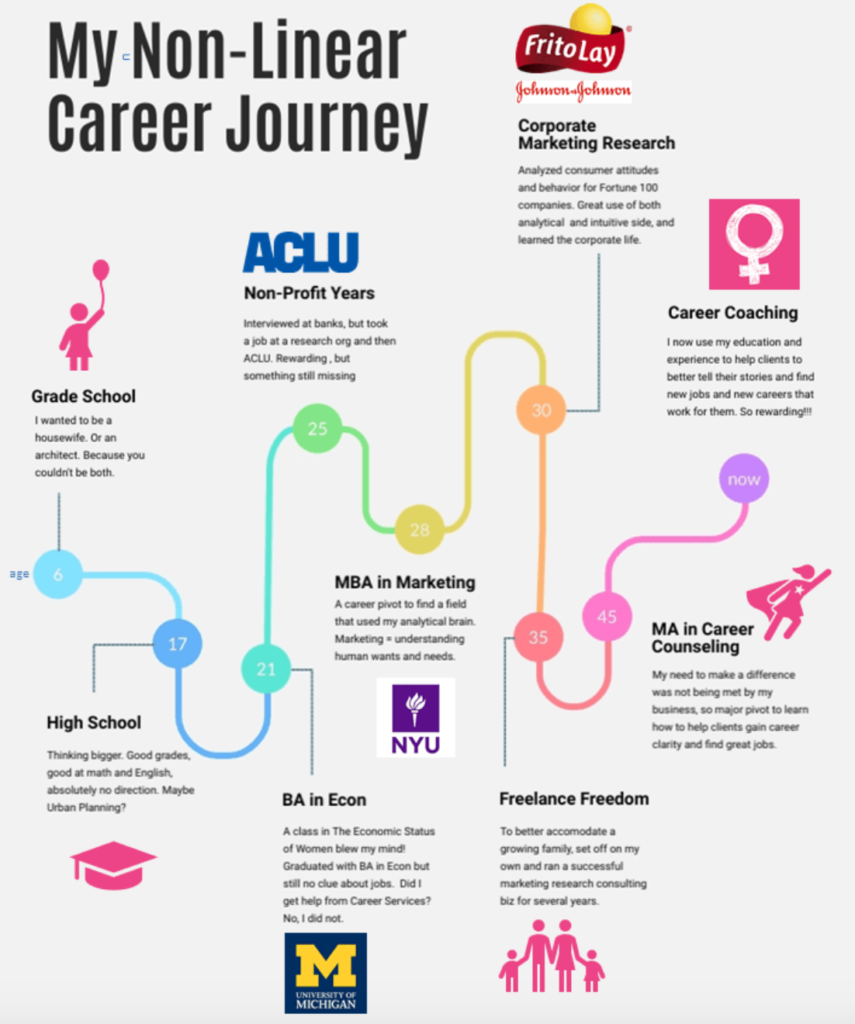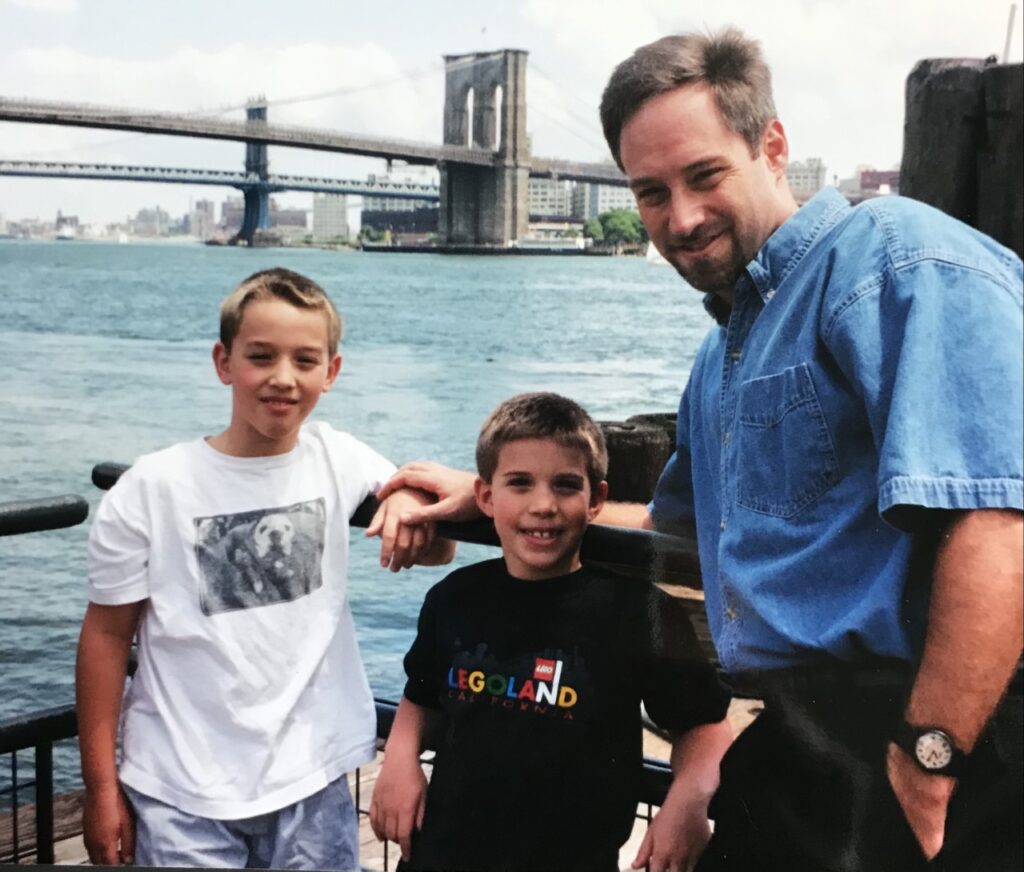For years, whenever I Googled stories of fellow trailing spouses, the search results focused on expat experiences or career disappointments. I’m so glad that I recently discovered Trailing-Spouse.com, filled with inspiring stories of all kinds of people who “get” my challenges and have also seized opportunities for professional and personal growth along the way.
In my case, I’ve experienced seven moves — four prompted by a partner’s job loss. It’s a story of resilience, reinvention, and a LOT of networking. I now spend my time helping other women with their own reinventions, sharing the lessons I’ve learned along the (hard) way through my own non-linear journey.

Move #1: Michigan to Hawaii
Gupte Scale: 10/15 (5 points for destination, 5 points for timing, 0 points for resources)
I took the plunge early at the tender age of 19, while pursuing an economics degree close to home at the University of Michigan. My boyfriend, an ancient man of 25, got an offer to work in a hotel art gallery in Hawaii. We were living through a miserable winter, so my immediate reaction was “you betcha” — but I was smart enough to think through my own career consequences. Would I still be able to earn my bachelor’s degree from the University of Michigan (the “Harvard of the Midwest”) or would my diploma be from the University of Hawaii (a good school, but not as nationally renowned)?
After consulting with my advisor, I was assured that my adventure would be considered a “study abroad” experience and I would still be able to get my degree from Michigan. So, off I went.
This was my first experience with reinvention. I showed up to my new campus in my boho maxi skirts and practical shoes, surrounded by fellow female students in bikini tops and high-heeled sandals. Yikes! I adapted enough to feel less out of place, but couldn’t see myself staying there long-term.
In the meantime, I expanded my worldview by learning about Hawaiian culture, world trade, and world religion, which hadn’t seemed as relevant in Michigan. In fact, anti-Asian racism was rampant in Detroit at the time, worsened by intense competition in the auto industry, so I embraced the opportunity to acquire a completely different perspective than my fellow Michiganders.
Move #2: Hawaii to New York
Gupte Scale: 11/15 (5 points for destination, 5 points for timing, 1 point for resources)
After my boyfriend lost his job (conveniently, at the same time I graduated), my second big move was to his hometown: New York City. Neither of us had a job waiting, but his family found us a cheap place to live, and I was eager to bite the Big Apple. For a sheltered girl from the Midwest, NYC was multicultural heaven.
With my freshly minted Econ degree, I used my tiny network to snag an interview at a top Wall Street bank — but I could immediately tell that I didn’t fit in with all the hard-charging types from actual Harvard. Instead, I accepted an administrative assistant position at The Alan Guttmacher Institute, a nonprofit research institute associated with Planned Parenthood.
Although I was technically the trailing partner, I was suddenly the breadwinner, because my salary was higher than my boyfriend’s. This experience gave me the confidence to ask myself some tough questions: Am I financially ambitious and competitive? What organizational values do I want to support? Am I happy in my relationship?
My nonprofit work felt rewarding, but I was frustrated by the lack of innovation and efficiency. I left the Guttmacher Institute and tried my hand at fundraising for the ACLU Foundation, but grew frustrated with the office politics. Needing a change, I decided to go back to school… and to end my relationship.
Within a few months, I went from following — both personally and professionally — to determining my own path while pursuing an MBA at New York University. I was now an urban girl all the way, loving every minute of life in a dense metropolis.
And then, when I least expected it, I met my husband. A fellow grad student, he had earned his degree a semester before me and landed a job in a different state.
Once again, I would be a trailing spouse — officially, this time.

Move #3: New York to Connecticut
Gupte Scale: 6/15 (1 point for destination, 5 points for timing, 0 points for resources)
Although the timing of this move worked well because I didn’t yet have a job, I felt depressed about leaving NYC for rural Connecticut. We had no friends or family nearby. There were tears, but I loved my new husband and we were committed to making the situation work for us both.
Within a few months, I landed a job that was a great fit, as a marketing research project manager/data analyst at Information Resources, the biggest supplier of sales data to the food industry. The salary was higher than I had previously earned, but even better, the job played into my analytical yet human-centered brain and aligned with my values of helping connect people with the information they needed.
As both of our careers progressed, we settled in and started our family.

Move #4: Connecticut to Texas
Gupte Scale: 7/15 (4 points for destination, 0 points for timing, 3 points for resources)
In a dual-career couple, someone is usually on the losing end of a relocation for one partner’s career. When the towing spouse wants to move for the sake of personal or professional ambition, rather than an economic necessity, it’s important to have honest, open conversations about the emotional costs and benefits to the trailing spouse (and kids).
After five years in Connecticut, my husband was recruited to a bigger job at a company in Dallas, Texas. Flattering, exciting — but complicated. We had our two sons, ages 3 and 5, to think about. We had made good friends. I had recently landed a part-time market research consulting job (the kind that’s hard to find) through someone I had met on the playground. We had a full life.
On the other hand, I didn’t love small town life and our kids were young enough to not be too disrupted by the move. The job offer was an important opportunity for my husband, and based on my previous transitions, I knew that we could make it work.
By tapping into my professional network, I managed to land an interview as a market research associate at Frito-Lay. I got a full-time offer, but determined that our move would be more successful with me working fewer hours and focusing the rest of the time on our young family’s transition. Thanks to my strong skillset and recommendations, I was able to negotiate a part-time role.
For the next five years, we learned all about Texan culture, ate a lot of smoked brisket and jalapeños, learned that “y’all” means one person and “all y’all” is a group, and took advantage of Texan hospitality by meeting lots of new people and making very close friends.
Move #5: Texas to New Jersey
Gupte Scale: 8/15 (4 points for destination, 0 points for timing, 4 points for resources)
Moving for new opportunity by choice can feel exhilarating. Moving because your spouse was fired and can’t find a local job, however, is much more stressful.
In the back of my mind, I had known we were on borrowed time with my husband’s position; the average tenure of a chief marketing officer was 36 months. We beat the odds at five years, but another move was inevitable. This time, we would be heading back to the Northeast for my sixth state: New Jersey.
Once you’ve experienced at least three trailing spouse moves, it begins to feel more normal to be researching new cities and new school districts, rather than focusing on putting down roots. You’ve gotten good at this! But as the years progress and your kids are older, these moves do get tougher, emotionally and logistically. I decided to take a year off work, to help us all get settled again.
Ideally, by the third or fourth move, a trailing spouse who wants to continue working will have established extensive personal and professional networks that can help smooth over these types of resume gaps. He or she will also have mastered the art of career reinvention — with a hard-won understanding of which kinds of fields and positions are most “portable.”
Once I was ready to get back to work, my “playground” network came through again, when another parent mentioned an opportunity during my son’s playdate. Johnson & Johnson had an urgent need for my skill set, and was willing to have me work as a freelancer with a flexible schedule.
After a few years, however, I grew tired of researching consumer products; I wanted to help people with bigger problems. My previous investments in my husband’s career, by being willing and able to move cross-country, meant that he was now making a very comfortable salary — which allowed me to step back from corporate consulting and consider my own next move.
I decided to go back to my nonprofit roots and pursue a second master’s degree, this time in school counseling. I had helped our two boys through the college planning process; I was excited to help other teens make successful choices.

Of course, in the middle of my program, my dear husband lost his job.
Another great opportunity presented itself, this time in Chicago. As soon-to-be empty nesters, the prospect of living in a bustling metropolis again was enticing. But, I wouldn’t be able to be a school counselor there — Illinois required that you first be a classroom teacher — so, this move prompted yet another career pivot. I did some research, found out that I could be a college career counselor instead. After some informational interviews and additional research to confirm this would be a good fit, I adjusted my focus.
Move #6: New Jersey to Illinois
Gupte Scale: 13/15 (5 points for destination, 5 points for timing, 3 points for resources)

Chicago was everything we had hoped it would be. Our downtown condo overlooked the city lights and we walked everywhere, exploring all the neighborhoods. I advised students at Northeastern Illinois University and the University of Illinois at Chicago. Everything had fallen into place.
But, after just three years… another job loss. We were devastated and tried hard to find my husband a new position in Chicago, with no luck. Another great opportunity presented itself, this time in Portland, Oregon. We had heard wonderful things about “Portlandia,” and decided to take the plunge, once again.
Move #7: Illinois to Oregon
Gupte Scale 10/15 (5 points for destination, 2 points for timing, 3 points for resources)

It’s hard to believe that we’ve been here seven years — the longest I’ve spent in one place since beginning my trailing spouse journey!
Once we got to Portland, I spent a year researching opportunities and used my professional networking skills to land another great job at the Oregon Institute of Technology.
Last year, I decided to step back from my university job as director of career services and become an independent career coach. I now focus my energies to help women find great jobs, faster, with a special focus on trailing spouses and women who want to use their superpowers for good in the nonprofit/social impact sectors.
What’s your state of mind?
In my experience, women and trailing spouses often underestimate their own worth. If you’ve relocated multiple times due to a partner’s career, think about all the skills you’ve accumulated along the way: organizing moves, acclimating to new cultures, learning new languages, managing new schools and other transitions for your children, etc.
It’s a long list, even if you weren’t simultaneously managing a full-time paid position outside the home during those years.
You can boost your self-confidence and achieve a more resilient mindset by reflecting on your journey. Build on the positive examples and experiences that you can identify. In my case:
- Each of my relocations has been domestic, so I haven’t had the work authorization challenges that plague so many expat partners.
- I invested early on in a skillset (data analysis and market research) that was in demand and relatively portable.
- I am an introvert, but understood that I needed to make networking a priority as we moved to new places.
- I had an emotionally supportive spouse who understands what I have sacrificed to enable our cross-country moves.
- My husband’s career advanced in part due to our willingness to move, which in turn gave me the freedom to explore lower-paying careers that held deeper meaning for me.
- By continuing to work, even part-time, and minimizing my career breaks, I was better positioned to pursue and pivot to different kinds of professional opportunities.
- By training as a career coach, I have been able to apply those lesson to my own professional development, too.
I am grateful for the advantages that enabled me to continue working steadily throughout my seven moves, and for the lessons I learned along the way that can now help me help others, too.
Compared to my earlier years as a trailing spouse, career interruptions are no longer seen as an impossible barrier to employers — especially now that COVID-19 has had that impact on so many working families. Remote and flexible opportunities are more common than ever, too.
Whether you’re a first-timer or serial trailing spouse, if you’re struggling professionally due to a relocation, I highly recommend consulting with a career counselor or coach who understands those dynamics in addition to specializing in your field and/or location. Working with a coach who can help you articulate your strengths in a way that’s compelling to your target employers will help you get there and feel empowered by the process.
To learn more about Jennifer’s work, visit feministacareers.com.

